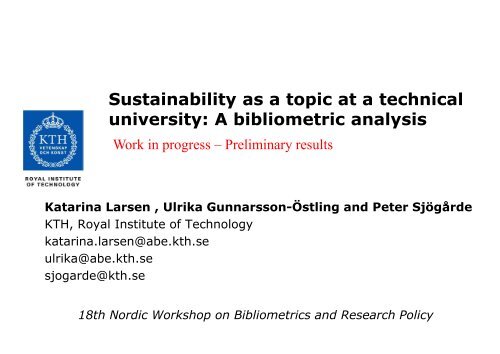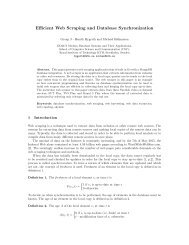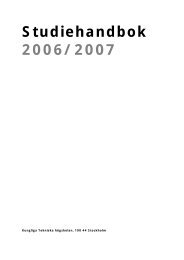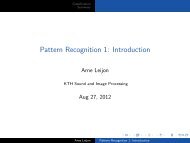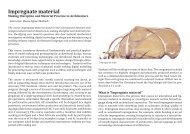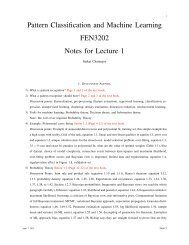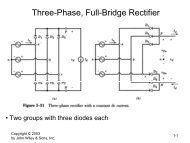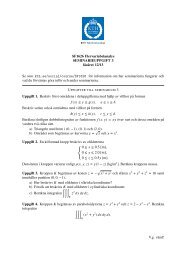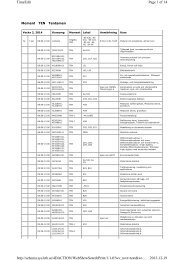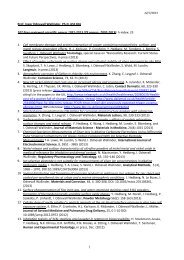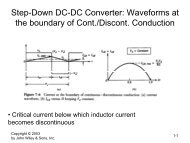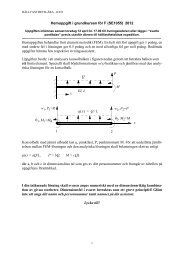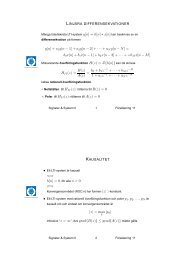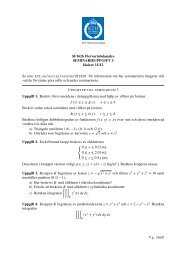Day 2 Session 3 - Larsen, Gunnarsson-Östling & Sjögårde.pdf - KTH
Day 2 Session 3 - Larsen, Gunnarsson-Östling & Sjögårde.pdf - KTH
Day 2 Session 3 - Larsen, Gunnarsson-Östling & Sjögårde.pdf - KTH
You also want an ePaper? Increase the reach of your titles
YUMPU automatically turns print PDFs into web optimized ePapers that Google loves.
Sustainability as a topic at a technical<br />
university: A bibliometric analysis<br />
Work in progress – Preliminary results<br />
Katarina <strong>Larsen</strong> , Ulrika <strong>Gunnarsson</strong>-<strong>Östling</strong> and Peter <strong>Sjögårde</strong><br />
<strong>KTH</strong>, Royal Institute of Technology<br />
katarina.larsen@abe.kth.se<br />
ulrika@abe.kth.se<br />
sjogarde@kth.se<br />
18th Nordic Workshop on Bibliometrics and Research Policy
Presentation outline<br />
• Background: sustainability policy<br />
• Research themes<br />
• Methods and data<br />
• Results: sustainability research and research areas<br />
• Discussion: conclusions and implications
Background: sustainability policy<br />
Brundtland report (UN 1987) solving the conflict between<br />
socioeconomic development and protection of the natural<br />
resource base by defining sustainable development as:<br />
‘development that meets the needs of the present without<br />
compromising the ability of future generations to meet their<br />
own needs’.<br />
Now: sustainable development as an essentially contested<br />
concept? Agree on ‘first level’ political meanings; under this<br />
apparent unity there is deeper disagreement. Makes it easy to<br />
modify to fit changing circumstances and vulnerable to<br />
hijacking and re-definition.
Research themes<br />
UNIVERSITY POLICY<br />
• specialization in areas of environmental engineering<br />
• cross-disciplinary involvement in natural sciences<br />
• show current examples of domains of sustainability<br />
research in areas of social sciences and humanities<br />
NATIONAL AND EU POLICY<br />
• Policy on research investments in Sweden and EU:<br />
Grand Challenges and Horizon 2020
Methods and data<br />
• Local publication database (DiVA). (Web of Science to be used<br />
in further work)<br />
• Two-step method: sustainability and wider search of terms to<br />
expand analysis of research publications not explicit mention<br />
sustainability/hållbar<br />
Step 1 search:<br />
Sustainability<br />
Hållbar<br />
Step 2 search:<br />
expansion of<br />
terms (beyond<br />
sustainability)
Methodological concerns<br />
• Step 1 – High precision, low recall<br />
• Step 2 – Balance between recall and precision<br />
• Example – Environmental (Environmental humanities,<br />
environmental management, environmental assessment…)<br />
waste, LCA,<br />
eco-design<br />
Sustainability<br />
wind power<br />
solar cells<br />
energy, electricity
Data and type of publications<br />
• Data: Local publication database (DiVA) and Web of Science<br />
• Time period: 2004-2013<br />
• Fields searched in: Title, abstract, keywords<br />
• Step 1 – search for ”sustainab*” and ”hållbar*”<br />
• 772 records<br />
• Step 2 – Extended search from retrieved keywords (119 words)<br />
• 2171 records<br />
Work in progress – Preliminary results
Step 2 – Publication types<br />
Publication type Count Share<br />
Article in journal 856 39.4%<br />
Article, review 22 1.0%<br />
Book 18 0.8%<br />
Book chapter 78 3.6%<br />
Collection/Anthology (editor) 12 0.6%<br />
Conference paper 607 28.0%<br />
Doctoral thesis 256 11.8%<br />
Licentiate thesis 174 8.0%<br />
Proceedings (editor) 10 0.5%<br />
Report 138 6.4%<br />
Total 2171 100.00%<br />
Work in progress – Preliminary results
Step 2 – Publications per year<br />
Year Count<br />
2004 110<br />
2005 182<br />
2006 153<br />
2007 141<br />
2008 168<br />
2009 231<br />
2010 274<br />
2011 371<br />
2012 364<br />
2013 177<br />
Total 2171<br />
Work in progress – Preliminary results
Step 2 - Languages<br />
Language Count Share<br />
eng 2095 96.5%<br />
ger 1 0.0%<br />
por 4 0.2%<br />
spa 1 0.0%<br />
swe 69 3.2%<br />
und 1 0.0%<br />
Total 2171 100.0%<br />
Work in progress – Preliminary results
Visualizations of word clusters<br />
• VOSviewer<br />
• Clusters from co-occurring words<br />
• Words in title, abstract and keywords<br />
• Stop lists<br />
• Delimitation<br />
- Most frequent words (occurring at least 7 times)<br />
- Most relevant words in clusters<br />
Eck, N.J. van, Waltman, L., 2010. Software survey: VOSviewer, a computer program for<br />
bibliometric mapping. Scientometrics 84, 523–538
Step 1 – Word cluster<br />
Work in progress – Preliminary results<br />
Red: Urban planning, ICT, Sustainability<br />
Pink: Water research<br />
Turquoise: Production systems<br />
Yellow: Materials research/engineering<br />
Blue: Fuel systems research<br />
Green: Electricity and heating
Step 1 Themes<br />
• Step 1:<br />
- Red: Urban planning, sustainability assessment<br />
- Yellow: material research, properties of environmentally friendly<br />
- Green: energy systems, solar<br />
- Blue: GHG green house gas, transport, biofuel<br />
- Pink: water (Arsenic, Bangladesh/India) and participation, gender<br />
- Turquoise: technical production systems, mobility
Step 2 – Word cluster<br />
Work in progress – Preliminary results<br />
Yellow: Traffic, wireless, communication<br />
Turquoise: Systems (adaptation)<br />
Red: Environmental performance/assessment<br />
Light blue: fuel cells, solar cell systems<br />
Blue: Materials (nano, wood, fibre, plastic)<br />
Green: Power system, turbine, heat pump<br />
Pink: Groundwater; contamination
Step 2<br />
• Turquoise: fuel cells, solar cell systems (dsc, electrolyte)<br />
• Blue: material sciences, polymer, cellulose, renewable resource<br />
• Pink: Agriculture, arsenic, Baltic sea<br />
• Green: hydropower, electricity production, wind power, solarthermal<br />
• Red: Strategic environmental, environmental history<br />
• Yellow: wireless networks, traffic, communication<br />
• Light blue: production system, university
Results: co-publication analysis of<br />
<strong>KTH</strong>-organizational units (step2)<br />
Work in progress – Preliminary results<br />
Electronic<br />
systems<br />
Fiber and<br />
polymer science<br />
Chemistry
Discussion: conclusions and implications<br />
• Two-step method to capture ‘sustainability turn’<br />
• Engineering sciences: areas of waste management,<br />
materials (solar cells), energy use and electricity networks<br />
(production, distribution and use)<br />
• Social sciences: planning, environment and sustainability<br />
• Not much interdisciplinarity (social-natural sciences)
Contributions and Further work<br />
• Analysis of research in the ‘sustainability turn’<br />
NOT defining sustainability research<br />
• DiVA: expanded analysis including both Web of<br />
Science of <strong>KTH</strong>s own publication database<br />
• Methodological analysis of a topic in two steps to<br />
examine areas of specialization in environmental<br />
research including natural as well as social<br />
sciences and humanities<br />
• Further analysis of citation data in research areas,<br />
journal areas where research is published,<br />
doctoral thesis – step 2 over 400!


